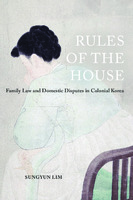Rules of the House
Family Law and Domestic Disputes in Colonial Korea
Author(s)
Lim, Sungyun
Collection
Knowledge Unlatched (KU)Language
EnglishAbstract
Rules of the House examines the transformation of the Korean family during and after Japanese colonial rule. Through in-depth reading of civil litigation records, the book shows how the Japanese colonial legal system transformed Korean families from the traditional patrilineal family system into small, patriarchal households. The new domestic pattern proved remarkably durable, forming the basis of postcolonial family life. Women feature prominently in the book. Increasingly marginalized by patriarchy, women embodied the fault line between one family system as it receded and the other as it expanded under the auspices of Japanese colonial law. As a consequence, women’s rights to family property, inheritance, divorce, and adoption of heirs were frequently challenged by family members. Far from being quiet victims, these women brought their cases to the colonial courts and won a surprising number of cases. The book highlights how legal discourse about women’s rights in colonial civil courts articulated the transformation of the family.
Keywords
colonial Korea (1910-1945); family law; civil disputes; customary law; assimilation policy; women; inheritance; adoption; divorce; Japanese family system (ie-seido)DOI
10.1525/luminos.60ISBN
9780520302525, 9780520972506OCN
1083013994Publisher
University of California PressPublisher website
https://www.ucpress.edu/Publication date and place
Oakland, 2019Grantor
Classification
History
Asian history
Gender studies, gender groups


 Download
Download